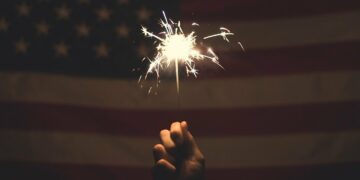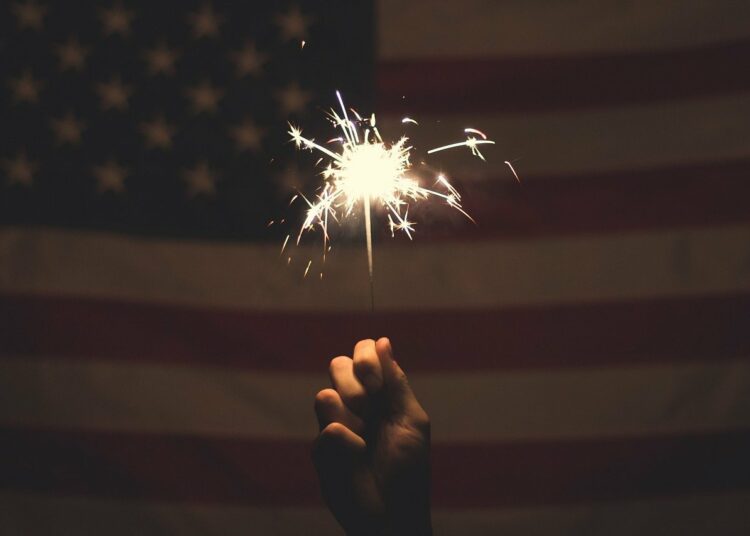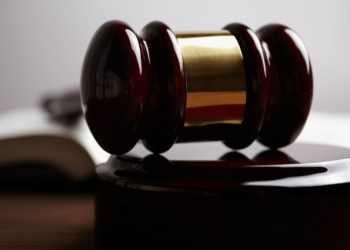Last updated on July 6th, 2021 at 09:04 am
“In 1776,” observed legal scholar Jethro Lieberman, “the sun shone on something new.” On July 4 of that year in Philadelphia, the delegates to the Second Continental Congress adopted a document that remains the most remarkable political declaration in history. It declared not only their independence from the mighty British Empire and their reliance on the Almighty “Supreme Judge of the world,” but also something transcendent, something beyond their own circumstance, something true for all time and all people everywhere.
We hold these truths to be self-evident, that all men are created equal, that they are endowed by their Creator with certain unalienable Rights, that among these are Life, Liberty and the pursuit of Happiness.—That to secure these rights, Governments are instituted among Men, deriving their just powers from the consent of the governed…
And in support of their Declaration of Independence, the delegates “mutually pledge[d] to each other” their lives, their fortunes, and their sacred honor. They did so fully aware of the implications, said Paul Harvey.
Fifty-six men placed their names beneath that pledge. Fifty-six men knew—when they signed—that they were risking everything. They knew if they won this fight, the best they could expect would be years of hardship in a struggling nation. If they lost, they’d face a hangman’s rope. But they signed… Five were captured by the British and tortured before they died. Twelve had their homes… sacked, looted, occupied by the enemy, or burned. Two lost their sons in the army. One had two sons captured. Nine of the fifty-six died in the war, from its hardships or from its more merciful bullets…. They were not poor men or wild-eyed pirates. They were men of means. Rich men, most of them, who enjoyed much ease and luxury in their personal living. Not hungry men. Prosperous men. Wealthy landowners, substantially secure in their prosperity. But they considered liberty—they had learned that liberty—is so much more important than security. [So] they pledged their lives… their fortunes… and their sacred honor. And they fulfilled their pledge. They paid the price. And freedom was born.
Born for America and the world, as attested by at least three of the signers. “We feel that we are acting under obligations not confined to the limits of our own society,” said Thomas Jefferson, and “it is impossible not to be sensible that we are acting for all mankind.” Writing from Paris, Benjamin Franklin reported, “’Tis a common observation here that our Cause is the Cause of all Mankind, and that we are fighting for their Liberty in defending our own.” And Benjamin Rush avowed, “I was animated constantly by a belief that I was acting for the benefit of the whole world, and of future ages.”
And so it has been, according to the official Monticello website: “The principles outlined in the Declaration of Independence promised to lead America—and other nations on the globe—into a new era of freedom. The revolution begun by Americans on July 4, 1776 would never end.” It would inspire individuals, peoples, nations, and even the United Nations when it drafted the Universal Declaration of Human Rights. In short, the Declaration of Independence is “the most important statement of human rights ever written,” said Secretary of State Mike Pompeo, and “America draws strength and goodness from her founding ideals.”
He was speaking in Philadelphia on July 16, 2020, at a ceremony announcing the release of the draft report by a commission he had created—the Commission on Unalienable Rights—to remind America of the timeless truths memorialized in the Declaration. “We can’t do good—at home or abroad—if we don’t precisely know what we believe and why we believe it,” explained Secretary Pompeo. “And that’s why I asked Professor [Mary Ann] Glendon to form a commission composed of some of the most distinguished scholars and activists. I asked them not to discover new principles, but to furnish advice on human rights grounded in our nation’s founding principles and the principles of the 1948 Universal Declaration of Human Rights. Because without this grounding… our efforts to protect and promote human rights is unmoored and, therefore, destined to fail.”
As of this writing shortly before Independence Day 2021, the Commission’s final report is still accessible online, but the official website of the Commission itself has been cancelled. “Cancel culture” is what President Trump warned of last year on the eve of July 4 as he stood in front of the towering likenesses of four American presidents, including Washington and Jefferson, carved into Mount Rushmore.
We gather tonight to herald the most important day in the history of nations: July 4th, 1776… Our Founders launched not only a revolution in government, but a revolution in the pursuit of justice, equality, liberty, and prosperity… It was all made possible by the courage of 56 patriots who gathered in Philadelphia 244 years ago and signed the Declaration of Independence. They enshrined a divine truth that changed the world forever when they said: “…all men are created equal.” These immortal words set in motion the unstoppable march of freedom. Our Founders boldly declared that we are all endowed with the same divine rights—given to us by our Creator in Heaven. And that which God has given us, we will allow no one, ever, to take away. And yet, as we meet here tonight, there is a growing danger that threatens every blessing our ancestors fought so hard for, struggled, [and] bled to secure. Our nation is witnessing a merciless campaign to wipe out our history, defame our heroes, erase our values, and indoctrinate our children…. Against every law of society and nature, our children are taught in school to hate their own country and to believe that the men and women who built it were not heroes, but that they were villains. The radical view of American history is a web of lies—all perspective is removed, every virtue is obscured, every motive is twisted, every fact is distorted and every flaw is magnified until the history is purged and the record is disfigured beyond all recognition.
Perspective is precisely what one immigrant brought to the fore in her spontaneous conversation with author Annette Gordon-Reed, an African-American Harvard historian and law professor. In the afterword to Jon Meacham’s book In the Hands of the People (a project of the Thomas Jefferson Foundation at Monticello), Gordon-Reed tells of her first visit to the Jefferson Memorial. It was in 2012, fifteen years after publishing her first book of several on Jefferson, one of which was awarded the Pulitzer Prize in History. Walking into the memorial she had previously seen only from afar, she was awed by the nineteen-foot statue of Jefferson and the inscription of his most famous words. She recalled,
The juxtaposition is fitting, for words and writing were so central to the role he played as a revolutionary and politician in the early American republic. Words, and the feelings they inspired, made Jefferson who he was. “The pen of the Revolution” wrote words that moved his generation, and those that followed, in the United States and across the globe: We hold these truths to be self-evident that all men are created equal, that they are endowed by their Creator with certain unalienable Rights, that among these are Life, Liberty and the pursuit of Happiness.
She thought also of some of Jefferson’s words not included in the memorial, words that “cast doubt on the capacity of forming a multiracial society in the country he helped to create.”
With those words, Jefferson was mostly a product of his time and place—a white Virginian of the eighteenth century. His prodigious imagination allowed him to see many things but did not allow him to take in the possibility that whites would be able give up their prejudices and live in harmony with blacks as equal citizens in a republican society.
So profound was her reflection on these matters that she failed to notice someone watching her as she walked through and finally away from the colossal memorial.
Deep in thought, walking along the path leading away from the monument, I suddenly heard footsteps coming fast behind me. I assumed they had nothing to do with me until my peripheral vision brought a young woman in a National Park Service uniform into view. She stopped running just by my side, turned to me and said, “You’re Annette Gordon-Reed.” I acknowledged that I was. She said she had seen me walking around the memorial and had intended to talk to me, but I had managed to slip away before she got the chance.
The young woman, still breathless from running, explained that she had read all of Professor Gordon-Reed’s writings about Jefferson. She had come to America from Somalia as a young woman, and her interest in Jefferson had been sparked by reading the Declaration of Independence. “She offered,” reported Gordon-Reed, “that Americans did not sufficiently appreciate the benefits of living in a society in which the government proclaimed no religious orthodoxy—indeed one in which a respected Founder had taken a position against such an orthodoxy so clearly and steadfastly.” The professor was “more than a little taken aback.”
A young female African immigrant, now citizen of the United States and Thomas Jefferson enthusiast, was not at all who I expected to encounter when I decided to make my first foray to the Jefferson Memorial. Unlike many people I talk to about Jefferson, this young woman had read a good deal of what he had written. Her judgment was considered. Still, I raised the obvious and difficult questions: What about slavery? What about race? “Oh, I know all about that,” she said with the wave of a hand. Everyone has flaws. But in this case, as far as she was concerned, the flaws did not outweigh his contributions or the importance of his more admirable ideas. I pressed a bit harder on the point. But she was unfazed. Americans, she said firmly, fixate too much on the person and not the ideas. For her, Jefferson was about the ideas, the words that voiced truths that had staying power across the ages and geography.
Gordon-Reed could not help but wonder what “our third president would think of the conversation about him that took place in the shadow of his monument.”
He might see it as evidence that his hope for the declaration, expressed in his letter to Roger Chew Weightman written in the month before he died, might actually be coming true: “May it be to the world, what I believe it will be, (to some parts sooner, to others later, but finally to all).” I know one young, Somali-American thinks so.
If we could visit with this wise immigrant today when cancel culture has become all the rage, I would be surprised if she did not repeat what she told Professor Gordon-Reed nearly a decade ago: We do “not sufficiently appreciate the benefits” of the freedom bequeathed by our Founders. I suspect she would also reiterate President Trump’s call issued last year when he spoke at Mount Rushmore about cancel culture: “Expose this dangerous movement, protect our nation’s children, end this radical assault, and preserve our beloved American way of life.” And I wonder if this well-read Somali citizen-scholar might even encourage us with the words Jefferson wrote to an English historian during construction of the University of Virginia: “Here we are not afraid to follow truth.”




















Discussion about this post